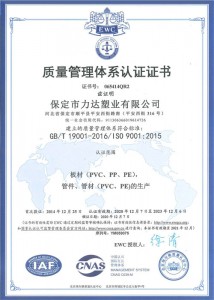Jul . 31, 2024 07:13 Back to list
Exploring the Benefits and Applications of HDPE Sprinkler Pipes in Modern Irrigation Systems
The Advantages of HDPE Sprinkler Pipes in Irrigation Systems
High-Density Polyethylene (HDPE) sprinkler pipes have gained wide acceptance in the agricultural and landscaping sectors for their remarkable properties and benefits. Made from a durable thermoplastic, HDPE pipes are specifically designed to meet the demands of various irrigation systems. Their unique composition, coupled with advanced manufacturing techniques, makes them a preferred choice for both residential and commercial irrigation projects.
One of the most significant advantages of HDPE sprinkler pipes is their resistance to corrosion and chemical damage. Unlike traditional metal pipes, which can corrode over time and degrade the quality of water, HDPE pipes maintain their integrity even in extreme environmental conditions. This is particularly beneficial for agricultural applications where fertilizers and other chemicals are often used. HDPE pipes do not leach harmful substances into the soil or water, ensuring that the irrigation process remains safe and effective.
The Advantages of HDPE Sprinkler Pipes in Irrigation Systems
The durability of HDPE pipes is another crucial factor that contributes to their popularity. They are designed to withstand significant pressure, making them suitable for high-pressure systems. Moreover, HDPE pipes are resistant to impact and can endure harsh environmental conditions, including extreme temperatures. This resilience results in fewer maintenance issues and longer service life, ultimately reducing replacement and repair costs.
hdpe sprinkler pipe

Water conservation is an essential consideration in modern irrigation practices, and HDPE pipes excel in this area as well. The smooth interior surface of these pipes minimizes friction losses, ensuring efficient water flow and pressure maintenance. With optimized water delivery, farmers and landscapers can minimize waste and maximize water usage, contributing to more sustainable agricultural practices. Additionally, the use of advanced sprinkler designs in conjunction with HDPE pipes can further enhance water distribution uniformity, leading to better crop yield and healthier landscapes.
Environmental considerations also play a significant role in the increasing popularity of HDPE sprinkler pipes. As a recyclable material, HDPE is not only stronger and more durable than conventional piping materials, but it also presents a more environmentally friendly option. Once the pipes reach the end of their service life, they can be recycled into new products, thus reducing landfill waste and promoting a circular economy.
Furthermore, the installation of HDPE pipes can aid in the achievement of sustainable goals set by various agricultural bodies and environmental organizations. By adopting efficient irrigation systems that utilize HDPE sprinkler pipes, farmers can play a vital role in preserving water resources and promoting environmentally responsible practices.
In conclusion, the advantages of HDPE sprinkler pipes make them an invaluable asset in modern irrigation systems. Their resistance to corrosion, flexibility, durability, and water efficiency position them as a superior choice for both agricultural and landscaping applications. With environmental sustainability becoming increasingly crucial, HDPE pipes provide a viable solution for those looking to implement effective and responsible irrigation practices. As the demand for efficient water management continues to grow, HDPE sprinkler pipes will undoubtedly play a central role in shaping the future of irrigation technologies.
-
Durable PP Rigid Sheet: Lightweight, Chemical Resistant Solutions
NewsAug.21,2025
-
PVC Grey Sheet for Extraction: Chemical Resistant & Durable
NewsAug.19,2025
-
Durable PVC Pipe Fittings for Plumbing & Irrigation Needs
NewsAug.18,2025
-
HDPE Steel Belt Reinforced Spiral Corrugated Pipe | High Strength
NewsAug.17,2025
-
HDPE Pipe Fittings: Durable, Leak-Proof Solutions
NewsAug.16,2025
-
Premium CPVC Sheet: High-Temp & Chemical Resistant Solutions
NewsAug.15,2025

